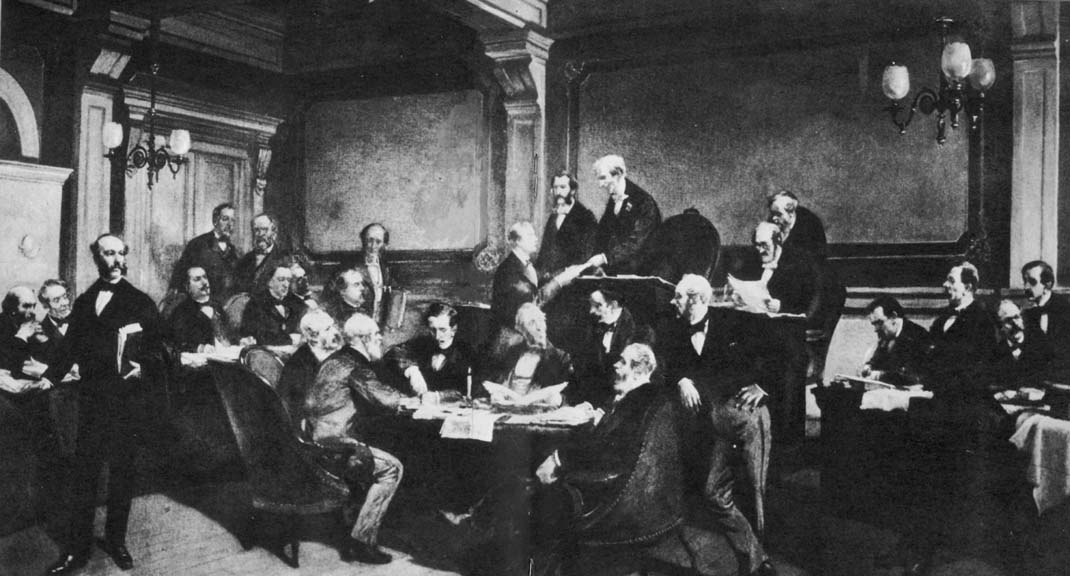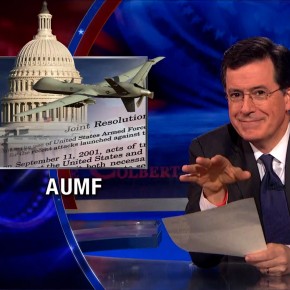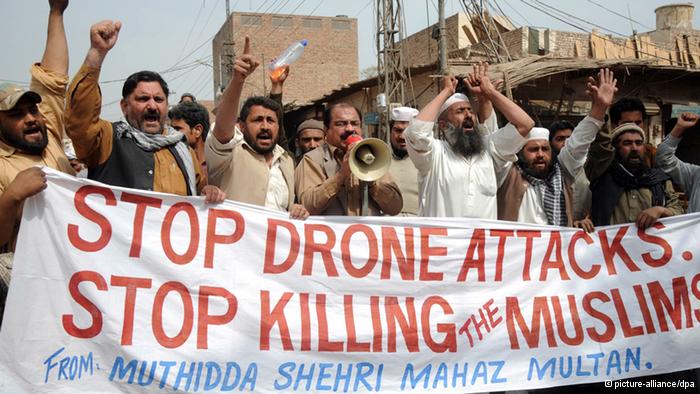The Portals are multimedia collections covering a variety of issues relating to drones. For our full list of Portals, click here.
The CIA’s targeted killing program in Pakistan, Yemen, and Somalia has raised concerns among lawyers and human rights advocates who claim that U.S. drone strikes outside of declared war zones violate international humanitarian law, also known as the laws of war. At issue is whether these strikes conform to the just war principles of discrimination and proportionality. Meanwhile, within the United States, a parallel legal debate is taking place over whether the President has the authority under the 2001 Congressional Authorization for Use of Military Force (AUMF) to engage in targeted killings across the globe.
In this Portal, we explore the history of the laws of war, the current debates on law and strategy within the United States, the challenges posed by emerging technologies to law, and the legal critique and defense of drone strikes.
This Portal is curated by Dan Gettinger @GettDan.

Part One: the Laws of War
- “Lincoln’s Code: The Puzzling History of the Laws of War” – Yale Law School // Audio // 01:03:00 // February 28, 2011
In this lecture, Professor Fabian gives a historical account of how the laws of war emerged from a debate within the Union over the ends and means of the Civil War. He discusses the evolution of the rules and interpretation of the laws of war then and now. John Fabian Witt is Allen H. Duffy Class of 1960 Professor of Law at Yale Law School. He is the author of Lincoln’s Code: The Laws of War.
- “Where to Now for Just War Theory?” – Oxford University // Audio // 01:00:21 // February 8, 2013
Jeff McMahan, a professor at Rutgers University, speaks with Dr. Janina Dill and Dr. Hugo Slim about just war theory. Topics covered included the problems posed to just war theory by emerging technologies such as cyber. This event was part of Oxford University’s Ethics, Law and Armed Conflict seminar.
- “Legal and Moral International Norms Since 1914” – Carnegie Council for Ethics in International Affairs // Audio/Video // 00:30:22 // June 27, 2014
Lecture by Sir Adam Roberts, Emeritus Professor of International Relations at Oxford University. “What lessons has humankind learned from the events of 1914 in Sarajevo? And are there further lessons that we should have learned, but didn’t? Have our legal and moral norms changed (hopefully for the better) in the years since?”
For more on International Humanitarian Law, visit the International Committee of the Red Cross – War and Law

Part Two: Law, Policy, and Strategy
- “60 Words” – Radiolab // Audio // 00:58:57 // April 18, 2014
This episode of Radiolab considers the 2001 Authorization for Use of Military Force (AUMF). “This hour we pull apart one sentence, written in the hours after September 11th, 2001, that has led to the longest war in U.S. history. We examine how just 60 words of legal language have blurred the line between war and peace.”
Reading: “60 Words And A War Without End: The Untold Story Of The Most Dangerous Sentence In U.S. History” by Gregory Johnson (Buzzfeed).
- “President Obama’s Speech on Counterterrorism at the National Defense University” – New York Times // Video // 00:59:00 // May 23, 2013
President Obama delivered his first major speech on counterterrorism at the National Defense University in May 2013. He addressed in general terms the use of drones, the diffusing al-Qaeda threat, and the legal framework for U.S. counterterrorism operations.

Reading: “Pivoting From a War Footing, Obama Acts to Curtail Drones” by Peter Baker (New York Times)
- “AUMF Repeal” – Colbert Report // Video // 00:08:01 // May 23, 2013
Stephen Colbert responds to President Obama’s speech on counterterrorism at the National Defense University. “President Obama wants to repeal 60 words of eternal war-justifying deliciousness, but Senator Lindsey Graham would rather broaden Obama’s war powers.”
- “Lawfare Podcast Episode #72: A Debate on the Future of the AUMF” – Lawfare // Audio // 01:05:00 // April 2014
“Ben [Emmerson] debated Georgetown Law professor Rosa Brooks on the future of the AUMF during a Pepperdine University School of Law symposium at, entitled ‘The Future of National Security Law.’ Gregory McNeal, a frequent Lawfare contributor and professor at Pepperdine Law, moderated the discussion.”
- “Congress Rising: Obama, Iraq, Syria and the Use of Force” – Wilson Center // Video/Audio // 01:09:10 // November 12, 2014
A discussion among Jane Harman, Sen. Tim Kaine, Jack Goldsmith, and Jim Sciutto on the President’s legal authority to use military force against the Islamic State. The panelists discuss the 2001 AUMF and whether Congress should pass a new authorization in light of the evolving threat.
- Zenko, Micah. “What the Pentagon Wants in a New AUMF: Perpetual Warfare.” Web log post. Council on Foreign Relations. N.p., 24 Jan. 2015. Web.
- Wright, Andy. “AUMF Proposals and Congressionally Mandated Reporting Requirements: Some Guideposts.” Web log post. Just Security. N.p., 23 Jan. 2015. Web.”
Part Three: Drones and Laws of War
- “Rules of Engagement: The Legal, Ethical and Moral Challenges of the Long War” – The Center for the Study of the Drone and the Carnegie Council for Ethics in International Affairs // Video // 01:18:38 // February 6, 2014
A panel discussion on the legal challenges posed by the “War on Terror.” Are drone strikes within the authority of the executive branch and how far does that mandate extend? Discussants include: Charles A. Blanchard, former General Counsel, U.S. Air Force; Kenneth Anderson, Professor of Law, American University, Washington College of Law; Robert Grenier, former Director, C.I.A. Counterterrorism Center. Transcript available here.

- “The Efficacy and Ethics of U.S. Counterterrorism Strategy” – Wilson Center // Video // 01:09:28 // April 30, 2012
“One year after the raid that delivered justice to Osama Bin Laden, John Brennan, Assistant to the President for Homeland Security and Counterterrorism, delivered remarks on the Efficacy and Ethics of the President’s Counterterrorism Strategy.” Mr. Brennan is the former Assistant to the President for Homeland Security and Counterterrorism and is the Director of the Central Intelligence Agency.
- “21st Century Warfare Conference – Jeh Johnson – Keynote Speech” – Center for National Security – Fordham Law // Video // 00:54:35 // March 18, 2013

Secretary of Homeland Security Jeh C. Johnson
Jeh Johnson discusses the potential utility and challenges of creating specialized “drone courts” to consider cases of targeted killing. Johnson is the Secretary of Homeland Security and the former lead counsel at the Department of Defense.
- “Legitimate Targets? The Partial Effectiveness of International Law in US Air Warfare” – Oxford University // Audio // 01:28:00 // November 14, 2013
Dr. Janina Dill is a Departmental Lecturer at the Department of International Relations, Oxford University. This lecture was organized by the Changing Character of War programme at Oxford. Topics Covered: applicability and effectiveness of international law to modern war, different interpretations of international law, legalization of U.S. air warfare, logic of sufficiency and efficiency in bombing strategy, legal metrics in targeting.
- “The Battlefield from Afar: Independently Operating Systems and their Compatibility with the laws of Armed Conflict” – Oxford University // Audio // 00:44:00 // February 21, 2011
Markus Wagner speaks at Oxford University about how remotely operated weapons have dissolved the territorial confines of contemporary conflict. This lecture is part of the 2011 Hilary term Ethics, Law and Armed Conflict and Changing Character of War seminar series. Wagner is an Associate Professor of Law at University of Miami Law School.
- “Drone Attacks Under the Jus ad Bellum and Jus in Bello: Clearing the ‘Fog of Law’” by Michael N. Schmitt (Yearbook of International Humanitarian Law)
- “Drone Warfare and the Law of Armed Conflict” by Ryan J. Vogel (Denver Journal of International Law and Policy, Vol. 39, No. 1, 2011)
- “Who May Be Killed? Anwar al-Awlaki as a Case Study in the International Legal Regulation of Lethal Force” by Robert Chesney (Yearbook of International Humanitarian Law, Vol. 13, M.N. Schmitt et al, eds., 2010 )

Part Four: Human Rights, Law and Drone Strikes
- “Drone Technology and Humanitarian Law Implications” – American Society of International Law // Video // 01:22:06 // March 25, 2011
“Legal scholars spoke about the use of unmanned drones by the U.S. military and ambiguities in the law regarding the use of aerial drones. They also responded to questions from the audience.”
- “Drone U Podcast: Drones, the Future of War, and the Law” – Slate: Future Tense // Audio // 00:07:40 // April 24, 2013
“Naureen [Shah] argues that whatever the advances of drone technology, the U.S. should be responding to reports of potentially unlawful killings rather than simply saying that they don’t exist.”
- “Drones in Yemen a personal perspective” – C-SPAN // Video // 01:37:23 // April 24, 2013
“In his opening remarks, Yemini youth activist Farea Al-Muslimi talked about the drone strike that hit his village in Yemen to kill a suspected terrorist, which also caused many civilian casualties.”
- “Lawfare Podcast Episode #31: Special Edition: Ben Emmerson Discusses His Investigation” – Lawfare Blog // Audio // 00:41:00 // May 14, 2013
“UN Special Rapporteur on Human Rights and Counterterrorism, Ben Emmerson, came by the Brookings Institution this morning for a wide-ranging discussion on his investigation of drone strikes.”
- “The Civilian Impact of Drone Strikes: Unexamined Costs, Unanswered Questions” – Columbia Law School Human Rights Institute
- “Precisely Wrong: Gaza Civilians Killed by Israeli Drone-Launched Missiles” – Human Rights Watch
Bookshelf
Bergen, Peter L., and Daniel Rothenberg. Drone Wars: Transforming Conflict, Law, and Policy. Cambridge, England: Cambridge University Press, 2014. Print.
Goldsmith, Jack L. Power and Constraint: The Accountable Presidency After 9/11. New York: W.W. Norton, 2012. Print.
Klaidman, Daniel. Kill or Capture: The War on Terror and the Soul of the Obama Presidency. Boston: Houghton Mifflin Harcourt, 2012. Print.
Walzer, Michael. Just and Unjust Wars: A Moral Argument with Historical Illustrations. New York: Basic, 1977. Print.
Whitman, James Q. The Verdict of Battle: the Law of Victory and the Making of Modern War. Cambridge, MA: Harvard UP, 2012. Print.
Blogroll
Syllabi
- “Rules of War” – University of Massachusetts-Amherst // Dr. Charli Carpenter // Fall 2013
- “The Politics of International Law” – New York University // George Downs // Fall 2009
- “The Law of War” – Columbia University // Brooke Greene // Spring 2013
- “International Humanitarian Law” – University of Minnesota Law School // Professor Fionnuala Ni Aoláin // Spring 2012
For updates, news, and commentary, follow us on Twitter.
[includeme file=”tools/sympa/drones_sub.php”]
